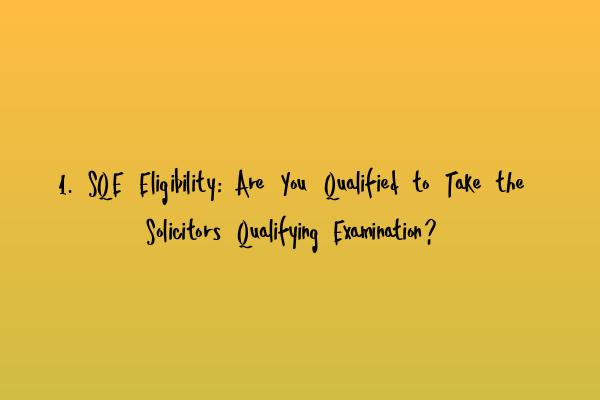SQE Eligibility: Are You Qualified to Take the Solicitors Qualifying Examination?
Are you dreaming of becoming a solicitor in England or Wales? The Solicitors Qualifying Examination (SQE) is the new centralised assessment that all aspiring solicitors must pass. But before you dive into the world of SQE preparation, it’s important to determine if you meet the eligibility criteria to sit for the exam. In this article, we will discuss the SQE eligibility requirements, so you can determine if you are qualified to take the SQE.
What is the Solicitors Qualifying Examination (SQE)?
The SQE is a new assessment framework introduced by the Solicitors Regulation Authority (SRA) to ensure consistency and high standards in the qualification process for solicitors. It is a two-part examination that covers both practical legal skills and legal knowledge.
The SQE is designed to replace the traditional route to qualification, which involved completing a law degree (LLB) or the Graduate Diploma in Law (GDL), followed by the Legal Practice Course (LPC). Under the new SQE regime, candidates can demonstrate their legal competence through a combination of education, work experience, and passing the SQE exams.
SQE Eligibility Criteria
Now, let’s dive into the eligibility criteria for the SQE. It’s crucial to ensure that you meet these requirements before investing your time and resources into preparing for the exam.
Academic Qualifications
The SRA does not require candidates to have a specific degree to be eligible for the SQE. Whether you have a law degree, non-law degree, or even no degree at all, you can still sit for the SQE. However, you must hold an equivalent qualification to A-levels or higher in any subject. This means that if you do not have a degree, you need to have completed two A-levels or equivalent qualifications.
It’s worth noting that while the SRA has removed the requirement for a specific degree, law firms may still have their own preferences when it comes to hiring candidates. So, it’s essential to consider your career goals and the potential requirements of future employers before deciding on your educational path.
Work Experience
Work experience is a crucial aspect of the SQE eligibility criteria. The SRA requires candidates to have at least two years of qualifying work experience (QWE) before they can qualify as solicitors. QWE can be gained through various routes, such as:
- Working in a law firm or other legal environment
- Working in a non-law firm where the work is of a legal nature
- Legal pro bono work
- Paralegal work
The purpose of QWE is to ensure that candidates have practical experience in a legal setting before qualifying as solicitors. It provides an opportunity to apply legal knowledge in real-world situations, develop essential skills, and understand the realities of the legal profession.
It’s important to note that QWE can be gained before, during, or after completing the SQE exams. However, the SRA requires candidates to complete the two-year period of QWE before they can apply for admission to the Solicitors Roll.
Character and Suitability
Character and suitability assessment is another integral part of the SQE eligibility process. The SRA wants to ensure that all solicitors meet the highest standards of ethics, professionalism, and integrity. Candidates are required to provide character references as part of their SQE application.
If you have any previous convictions or disciplinary issues, it’s essential to disclose them to the SRA. The SRA assesses each case individually, and having a previous conviction or disciplinary issue does not automatically disqualify you from taking the SQE. However, your honesty and evidence of rehabilitation will be taken into account during the assessment process.
Conclusion
Before embarking on your journey to become a solicitor through the SQE route, it’s crucial to ensure that you meet the eligibility criteria. Understanding the academic qualifications, work experience requirements, and character and suitability assessments will help you determine your eligibility to sit for the exam.
If you meet the SQE eligibility criteria, it’s time to start preparing for the exams! Check out our SQE 1 Practice Exam Questions and SQE 1 Practice Mocks FLK1 FLK2 to boost your SQE 1 preparation. Additionally, if you are looking for comprehensive preparation courses, our SQE 2 Preparation Courses and SQE 1 Preparation Courses are designed to help you succeed in the exams.
Stay updated with the latest news and SRA SQE Exam Dates to ensure you are always on track with your SQE preparation. Good luck on your journey to becoming a solicitor!
